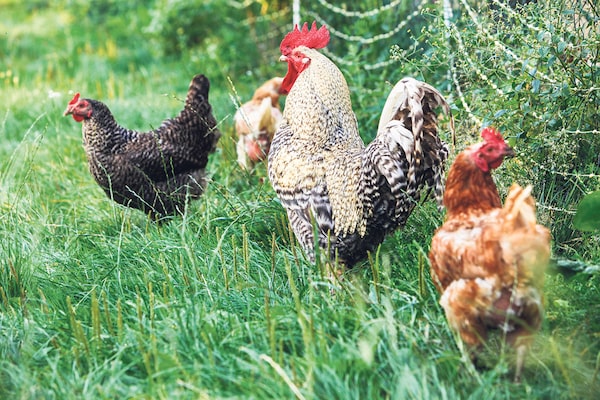
It all starts at the farm, where chickens live in barns featuring natural light and ventilation, are free to roam about and even have seasonal access to outdoor pastureland where they can peck at the grass and ‘do bird things.’ISTOCK.COM
Until very recently, organic meat was only really available in the refrigerated meat section of the grocery store. There’s a reason for that. Creating ready-to-eat products for the everyday shopper that include organic meat as an ingredient is more complex than you may think. For Yorkshire Valley Farms, a leading Canadian organic poultry producer, raising organic poultry and bringing it to market are as much a labour of love as a business enterprise. “A lot of people don’t understand the many layers and complexities of the organic system and all the things that need to be done to maintain its integrity,” says Krysten Cooper, director of Corporate Strategy and Sustainability. “The organic chain of command is meticulously managed at all steps.”
It all starts at the farm, where chickens are raised following strict organic standards. The birds live in barns featuring natural light and ventilation, and are raised in lower density flocks, meaning they have more space than in non-organic environments. They are free to roam about, and even have seasonal access to outdoor pastureland where they can peck at the grass and ‘do bird things,’ like dust bathing. The chickens are not treated with antibiotics, which means it’s very important to the farmer that they are kept naturally healthy, since they cannot rely on medications. And finally, their feed is also organic and therefore pesticide-, herbicide- and GMO-free.
With organic poultry as the base, Yorkshire Valley Farms works to create wholesome organic meal offerings. The process to produce fresh poultry products – turkey and chicken – as well as eggs has been perfected by organic farmers over many years. But where it starts to get more challenging is when ingredients are added to make ready-to-cook products like nuggets, meatballs, burgers or pot pies. “As minor as some ingredients may be for some of these products, they must still be organic,” says Liz Kowpak, who heads up the company’s product innovation. “Even the facilities where we cook our products, like the bakery for our pot pies, have to be certified to organic standards,” she says. “It can be quite challenging to ensure the organic integrity of our products in every element of the process, but it’s very rewarding when it all comes together.”
The recent launch of a new organic product that will appeal to sandwich lovers – oven-roasted pre-sliced chicken and turkey – was particularly challenging. Deli meats are typically treated with sodium nitrites in order to maintain shelf life and colour. Yorkshire Valley Farms’ refrigerated deli meats are entirely nitrite free; their shelf life is managed through the use of natural ingredients and a newer processing method that achieves food safety without the use of additives. “We try very hard to keep our recipes simple. We want ingredients that people recognize and can easily pronounce, and use food preparation methods rather than chemically derived ingredients to meet food safety needs wherever possible.” says Ms. Kowpak.
“I look at the freezer aisle in the grocery store very differently now. Instead of thinking how delicious an item might be, I think about how many different ingredients would have had to be sourced, all the organic certifications that would have had to be verified, and all the work it would have taken to verify each stage, “ says Ms. Cooper. The integrity of the organic food system relies on the adherence to strict practices, principles, inspections and certifications, but it also relies on the passion of those who grow and produce the food we eat.
“It’s challenging, but it’s fun work,” says Ms. Kowpak. “We’re very proud of what we do.”
Advertising feature produced by Globe Content Studio. The Globe’s editorial department was not involved.